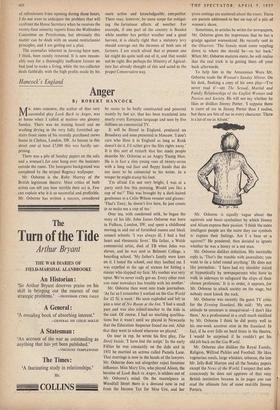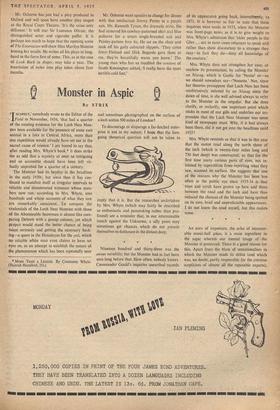Hancock' s'England
Anger
By ROBERT HANCOCK R. JOHN OSBORNE, the author of that very successful play Look Back in Anger, was at home when I called at teatime one gloomy Sunday. There was no ironing board and no washing drying in the very fully furnished up- stairs front room of his recently purchased mews house in Chelsea, London, SW. As houses in this street cost at least [7,000 this was hardly sur-. prising.
There was a pile of Sunday papers on the sofa and a woman's fur coat hung over the banisters outside the room. The bourgeois background was completed by the striped Regency wallpaper.
Mr. Osborne is the Ruby Murray of the British legitimate theatre. Most critics of both artists can tell you how terrible their act is. Few can explain why it is so successful and profitable. Mr. Osborne has written a success, considered by many to be badly constructed and powered mainly by hot, air, that has been translated into nearly every European language and seen by five Millions on commercial TV. '
It will be filmed in England, produced on Broadway and soon presented in Moscow. 'I don't care who films it in England as long as Rank doesn't do it. I'd rather give the film rights away.' It is this sort of remark that has made people describe Mr. Osborne as an Angry Young Man. He is in fact a slim young man of twenty-seven with a long sad face and floppy hands that do not seem to be connected to his wrists. In a temper he might stamp his foot.
`I'm afraid im not very bright, I was at a party until five this morning. Would you like a cup of tea?' This was brought by a dark-haired gentleman in a Colin Wilson sweater and glasses : `That's Tony; he doesn't live here, he just comes in to make me a cup of tea.'
Over tea, with condensed milk, he began the story of his life. John James Osborne was born in Fulham, London, SW, and spent a childhood moving in and out of furnished rooms and bleak council schools. 'I was always ill, I had a bad heart and rheumatic fever.' His father, a Welsh commercial artist, died of TB when John was eleven, and he was sent to Belmont College, a boarding school. `My father's family were keen on it. I hated the school, and they loathed me. I was expelled at the age of sixteen for hitting a master who slapped my face. My mother was very upset. We've never really got on. Every other man you meet nowadays has trouble with his mother.'
Mr. Osborne then went into trade journalism. 'As far as I remember I worked on the Gas World for £2 5s. a week.' He soon exploded and left to join a tour of No Room at the Inn. 'I had a small part and was also school-teacher to the kids in the cast. Of course, I had no teaching qualifica- tions but it wasn't until we played in Newcastle that the Education Inspector found me out. After that they went to school wherever we played.'
On tour in rep. he wrote his first play, The Devil Inside. 'I have lost the script.' In the early Fifties he was constantly on the dole and in 1951 he married an actress called Pamela Lane. That marriage is now in the hands of the lawyers. Mr. Osborne does not altogether reject feminine influence. Miss Mary Ure, who played Alison, the heroine of Look Back in Anger, is seldom out of Mr. Osborne's mind. On the mantelpiece in Woodfall Street there is a demand note in red from the Income Tax for Miss Ure, and her press cuttings are scattered about the room. There are parcels addressed, to her on top of a pile of women's shoes.
Sometimes, in articles he writes for newspapers, Mr. Osborne gives the impression that he has a grudge against womankind. He recently said in the Observer, The female must come toppling down to where she should be—on her back.' When Mr. Osborne matures more, he will realise that the real trick is in getting them off your back afterwards.
To help him in the Amazonian Wars Mr. Osborne reads the Woman's Sunday Mirror. On his desk, flanking a copy of his own play—`I've never read it'—are The Sexual, Marital and Family 'Relationships of the English Woman and Passion and Society. He will not say whether he likes or dislikes Jimmy Porter. 'I suppose there is more of me in Jimmy Porter than I realise, but there are bits of me in every character. There is a lot of me in Alison.'
Mr. Osborne is equally vague about the squirrels and bears symbolism by which Jimmy and Alison express their passion. 'I think the more intelligent people are the more they use symbols to express their feelings. Am I a bear or a squirrel?' He pondered; then decided to ignore whether he was a honey or a nut man.
Mr. Osborne dislikes definition. His inevitable reply is, 'That's the trouble with journalists; you want to tie a label round anything.' He does not like journalists: 'I have had my shoulder stared at hypnotically by newspapermen who have to walk in sideways to safeguard' the chips of ,their chosen profession.' It is in order, it appears, for Mr. Osborne to attack society on the stage, but nobody must knock the rock.
Mr. Osborne was recently the guest TV critic for the Evening Standard. He said : 'My own attitude to amateurs is unequivocal—I don't like them.' As a professional in a craft much misliked by Mr. Osborne I think he did pretty well in his one-week amateur stint in the Standard. In fact, if he ever falls on hard times in the theatre, I would be surprised if he couldn't get his old job back on the Gas World.
Mr. Osborne also dislikes the Royal Family, Religion, Wilfred Pickles and Football. He likes vegetarian meals, large whiskies, tobacco, the late Mr. Jelly-Roll Morton and all the Sunday papers except the News of the World. I suspect that sub- consciously he does not approve of that very British institution because in its pages you can read the ultimate fate of most real-life Jimmy Porters. Mr. Osborne has just had a play produced in Oxford and will soon• have another play .staged at the Royal Court Theatre. 'It's the same only different.' It will star Sir Laurence Olivier, the distinguished actor and cigarette puffer. It is perhaps too much to hope that the opening scene of The Entertainer will show Miss Marilyn Monroe ironing her smalls. He writes all his plays in long- hand in the form first of notes. This, as in the case of Look Back in Anger, may take a year. The translation of notes into play takes about four months. Mr. Osborne went upstairs to change for dinner with that intellectual Jimmy Porter in a purple suit, Mr. Kenneth Tynan, the dramatic critic. He had removed his cowboy-patterned shirt and blue pullover for a smart single-breasted suit and Paisley-pattern bow tie. He sat on the chair and took off his gaily coloured slippers. 'They come from Finland and Dirk Bogarde gave them to me, they're beautifully warm you know.' The young man who has so troubled the rentiers of South Kensington added, 'I really• have the most terrible cold feet.'













































 Previous page
Previous page